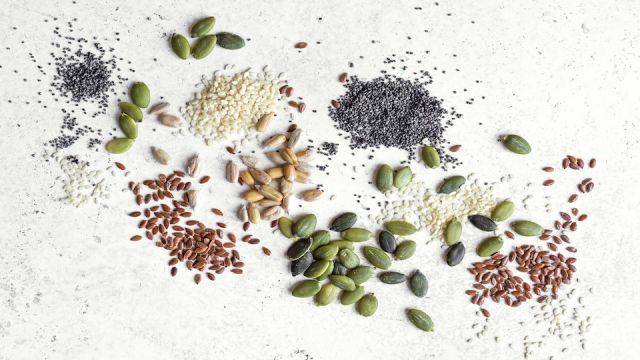
What if it was possible to stop a hot flash in its tracks, or ease frustration and pain of PMS? The trend of seed cycling is on the rise, but what exactly is it, and is it effective? It involves eating seeds, including flax, pumpkin, sesame, and sunflower at different times in the month to balance hormones. It is said to be effective for women who are menstruating, pre-menopause, postpartum, and post-menopause.
While there is a boatload of anecdotal accounts of its effectiveness, the scientific evidence to support the practice seems to be lacking. This, however, does not mean that it could not be useful for you.
Understanding hormonal influences
Hormones are heavily influenced by diet, sleep, stress, physical environment, and movement. When any of these are less than optimal, it can cause stress on your body’s natural biology and throw your hormones out of whack.
Most women produce enough hormones to keep their cycle healthy. However, certain conditions such as PCOS, chronic fatigue, and hypothyroidism as well as over-exercising and being under or overweight can cause hormones to rebel.
During menopause, levels of both estrogen and progesterone decrease, which leads to an increased risk of heart disease as well as symptoms like annoying hot flashes and weight gain.
Those that support seed cycling claim it can help women with healthy cycles and those struggling with issues as noted above.
How to seed cycle when you are menstruating
Typically, seed cycling involves eating flax and pumpkin seeds in the first, follicular phase (Days 1-14) of your cycle, when your period starts. You then consume a combination of sesame and sunflower seeds during the second, luteal phase (Days 14-28), or after ovulation.
In theory, when you consume certain compounds found in seeds during your menstrual cycle, it is supposed to establish more regular periods and improve hormone levels. This would be thanks to the fiber lignan, which is found in seeds, veggies, fruit, and plant-based protein sources.
Consuming flax and pumpkin seeds during the first phase of the cycle is thought to elevate estrogen level, and the sesame-sunflower duo is thought to boost progesterone
This complements the natural fluctuations in hormones during a woman’s cycle. Generally, estrogen levels are higher at the start of the month, and progesterone levels are higher during the second half of the month.
How to seed cycle if you are not menstruating
If you don’t have a regular period or are in perimenopause or menopause, seed cycling can still be beneficial. If you are perimenopausal and not cycling, you can start the seed rotation anytime and do two weeks of each rotation.
Some seeds, flax in particular, have been found to help elevate estrogen and improve hormone metabolism, reduce hot flashes, vaginal dryness, and better overall quality of life for both premenopausal and menopausal women.
Sesame seeds may also have a positive impact on menopausal women. In one study, it was found that women taking 50mg of sesame powder daily had improved hormonal balance as well as antioxidant and blood fat levels.
Other benefits of seeds
Even if you are not all on board with the whole seed cycling thing, there are numerous benefits to consuming more seeds. Flax, pumpkin, sesame, and sunflower seeds are all loaded with health-promoting fiber along with manganese, magnesium, copper, thiamine, vitamin E, and healthy fats. All of these nutrients are important for reproductive health as well as overall health and wellbeing.
Flax, sesame, and sunflower seeds have all been linked to improvements in heart disease risk factors, including high cholesterol and blood pressure.
Additionally, flax, pumpkin, and sunflower seeds show promise as protectors against breast cancer. Flax seeds are also linked to balanced blood sugar while pumpkin seeds may help with prostate and urinary conditions.
While more data is being collected on the benefits of seed cycling, it is still a great idea to include more healthy and nutritious seeds in your diet.
Tips for Success
- Use only raw, unroasted, unsalted, and unseasoned seeds to be sure that their medicinal properties have not been compromised. Use organic if available.
- Store seeds in a cool, dark place. The fridge is a great option.
- Use ground seeds within 15 minutes of grinding or keep store-bought pre-ground seeds in the freezer where they will not oxidize.
- Most people consume about one tablespoon of mixed seeds per day.
- Eat seeds with other foods such as smoothies, salads, and soups. Just be sure to add after cooking.
-The Alternative Daily

